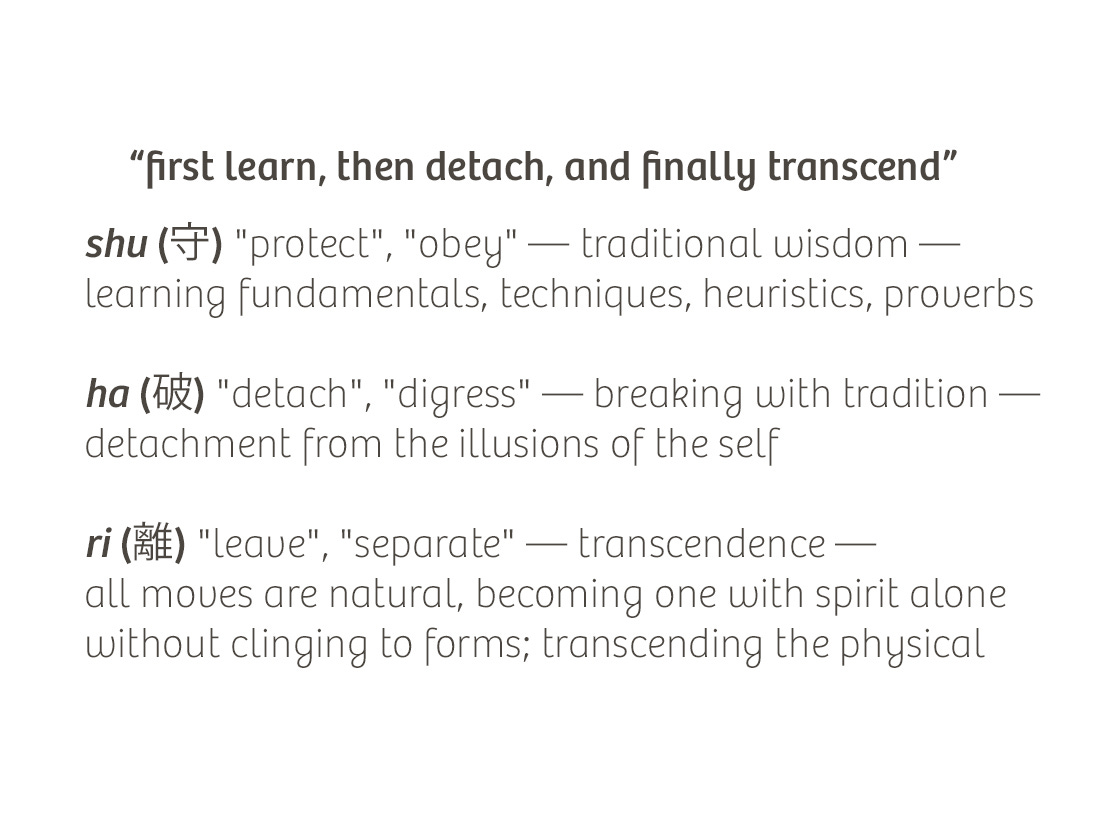Shu-Ha-Ri: Master The Three Stages of Gaining Knowledge.
To know the rules, you must first master them. To master them, you must first break them.
Growth, in any field, doesn't happen all at once. It follows a natural progression, a cycle of learning, questioning, and eventually transcending.
The Japanese concept of Shu-Ha-Ri captures this beautifully:
Shu (Learn): First, you follow the rules.
Ha (Break): Then, you begin to bend them.
Ri (Master): Finally, you move beyond them.
This framework applies to art, work, skill development, and personal growth. Understanding Shu-Ha-Ri isn't just about learning better. It's about learning deeper, knowing when to follow, when to challenge, and when to let go entirely.
Shu: The Discipline of Learning
In the Shu stage, you are an apprentice. You absorb knowledge without questioning it. You follow established techniques, rules, and structures.
A martial artist practices the same movements over and over again.
A musician plays scales before composing a song.
A chef follows recipes to the letter before creating their dishes.
This stage requires patience. Many people want to skip straight to innovation, but you can't break the rules effectively if you never understood them in the first place.
True freedom comes from discipline. Mastery begins with repetition.
Bruce Lee once said, "I fear not the man who has practiced 10,000 kicks once, but the man who has practiced one kick 10,000 times."
Ha: The Courage to Break the Rules
Once the fundamentals are internalised, you question, experiment, and adapt. You realise that rules are not absolute; they are starting points.
The martial artist modifies techniques to fit their body and fighting style.
The musician starts improvising, moving beyond strict notation.
The chef plays with flavours, breaking traditional pairings.
This is the stage where creativity is born. It's also where mistakes happen, but those mistakes are necessary. Growth doesn't come from perfect execution—it comes from pushing boundaries.
In Ha, you start to trust yourself. The rules that once guided you are no longer limitations. They become tools for expression.
Ri: The Flow of Mastery
In the final stage, Ri, you don't think about the rules anymore; you simply do.
The martial artist moves instinctively.
The musician plays with effortless flow.
The chef creates dishes intuitively, without needing recipes.
At this level, mastery looks effortless. But it isn't about perfection; it's about deep understanding. You have internalised the essence of your craft so entirely that you no longer need conscious effort. Your skill is a natural extension of yourself.
This is the space where true originality is born. The great masters, whether in martial arts, music, or life, don't just follow techniques; they redefine them.
Now, let's look at how to apply Shu-Ha-Ri to Life.
Shu-Ha-Ri isn't just about technical skills. It applies to everything:
Work: First, you follow processes. Then, you find better ways. Eventually, you innovate.
Relationships: First, you learn how to connect. Then, you develop your way of loving. Eventually, you create something unique and deeply personal.
Self-growth: First, you take advice. Then, you question it. Finally, you trust yourself to carve your path.
Most people make the mistake of trying to rush the process. They want mastery without discipline and originality without understanding; True growth takes time.
You can't skip Shu.
You can't avoid Ha.
And you can't force Ri.
Shu-Ha-Ri reminds us that mastery is not about shortcuts; it’s about evolution. First, you imitate. Then, you experiment. Finally, you own it.
Fancy ending this one also with a few nuggets of wisdom?
Follow the process first. You can’t break the rules you never learned. Master the basics before innovating.
Question and experiment. Once you understand the rules, explore their limits. Creativity is born in Ha.
Mastery feels effortless. When skill becomes second nature, you no longer need to think—you do.
Growth is a cycle. Even after reaching Ri in one area, you may return to Shu in another. The learning never stops.
Don’t rush the process. Each stage is necessary. Be patient with yourself.
The greatest artists, thinkers, and leaders don’t follow rules unthinkingly. But they don’t ignore them either. They understand them so deeply that they can break them with intention, not ignorance.
Whatever you’re trying to master, be it a skill, a craft, or even yourself, trust the process. Learn. Question. Transcend. And in time, mastery will come.





